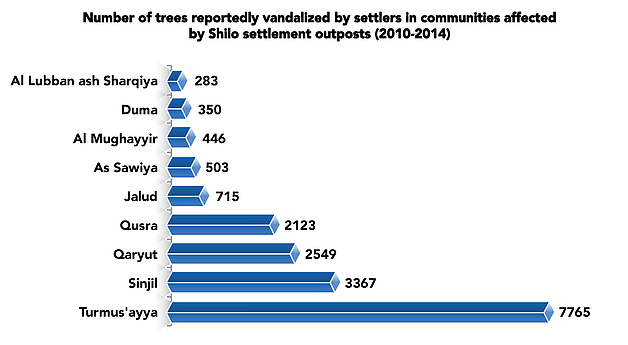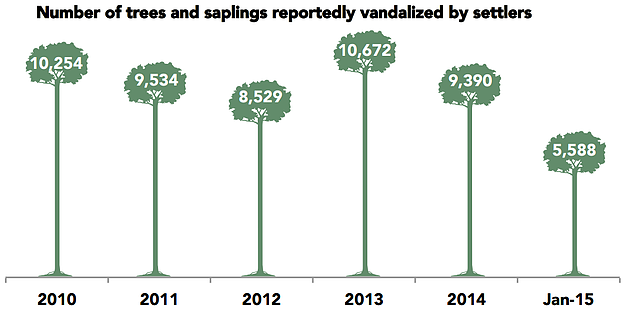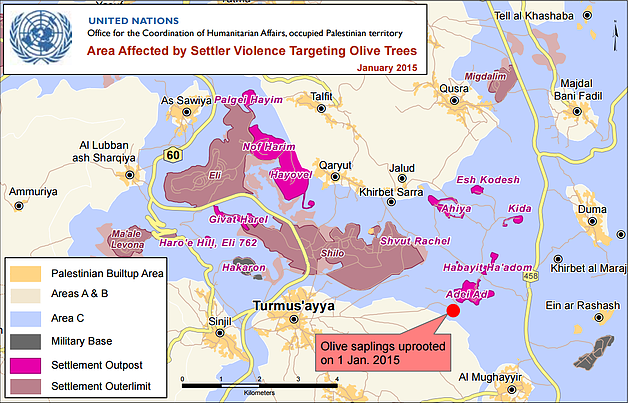West Bank: Largest Number of trees recorded vandalized by Israeli settlers in a single incident since 2005
Inadequate enforcement of the rule of law remains a key concern
During January, Israeli settlers reportedly uprooted or vandalized around 5,600 trees in seven incidents across the West Bank. This number is almost 60 per cent of all trees uprooted or vandalized in the whole of 2014. The olive oil industry constitutes 25 per cent of the agricultural income of the oPt and estimates suggest that about 100,000 families depend to some extent on the annual olive harvest for their livelihoods.

The gravest incident this month affected farmers from Turmus’ayya village in Ramallah, who, on the first day of 2015, discovered that around 5,000 of their olive saplings (two to three years old) had been uprooted. This is the largest number of trees uprooted in a single incident since as far back as 2005. Although there were no witnesses to the incident, based on the type of damage and past experience, community representatives attributed the attack to Israeli settlers from the adjacent settlement outpost of ‘Adei ‘Ad.

The latter is one of six settlement outposts to the east of Shilo settlement, which were established during the 1990’s in contravention to both Israeli and international law, but with the acquiescence of the Israeli authorities.[1] Part of the land taken over for the establishment of these outposts is privately owned by Palestinians, while the rest is public (also known as “state”) land. In recent years, some of these outposts, including ‘Adei ‘Ad, have been a source of systematic violence and harassment of Palestinians living in nine surrounding villages and a threat to the livelihoods and physical security of village residents.[2]

Inadequate law enforcement
To contain settler violence against Palestinian farmers, the Israeli authorities have limited Palestinian access to certain areas around 55 settlements and settlement outposts to a few days a year, subject to “prior coordination”. On these days, Israeli soldiers are deployed on the ground to prevent confrontations and the access of settlers to these areas is prohibited. While this system has resulted in fewer attacks on farmers, it has proved ineffective in preventing the theft and vandalism of olive trees outside these periods. Additionally, the access restrictions during the remainder of the year impede essential agricultural activities needed to plant or replant trees previously uprooted and maintain olive groves, such as ploughing, pruning, fertilizing, and pest and weed management, leading to a negative impact on olive productivity and value.
Failure to enforce the rule of law in relation to violent settlers remain a key concern, one which has been repeatedly highlighted by a range of local and international stakeholders, including the UN Secretary- General.[3]
This is reflected in the low accountability for attacks on Palestinian-owned trees. According to the Israeli NGO Yesh Din, over 96 per cent of complaints filed with the Israeli police in the past six years and followed by the organization regarding deliberate damage to trees by settlers, were closed without an indictment.[4]
This is despite special measures implemented by the Israeli authorities to address these failures, including the establishment of an inter-ministerial law enforcement streamlining team and a new unit within the police in 2013 (the Nationalistic Crimes Unit in Samaria & Judea District), responsible for addressing “ideological motivated crimes” by Israeli settlers against Palestinians. In practice, the success rate of investigations appears to have declined since 2013 compared with previous years: of the 159 complaints about settler violence filed in 2013-2014 and monitored by Yesh Din, only two cases (1.9 per cent) led to the indictment of suspects.[5]
[1] The other five outposts are: Esh Kodesh, Ahiya, Kida, Habait Ha’adom and Shvut Rahel.
[2] Yesh Din, The road to dispossession – The Adei Ad outpost, April 2013.
[3] Report of the Secretary-General to the Human Rights Council, 12 February 2014, A/HRC/25/38, paras 42-43.
[4] Yesh Din, 96.6 Percent of Investigations into Attacks on Palestinian Trees are Closed due to Police Failings. Indictments in Only Four Cases, 13 October 2014.
[5] Yesh Din, Data Sheet: Increase in Failure Rate of Police Investigation into Cases of Ideological Offenses against Palestinians.









